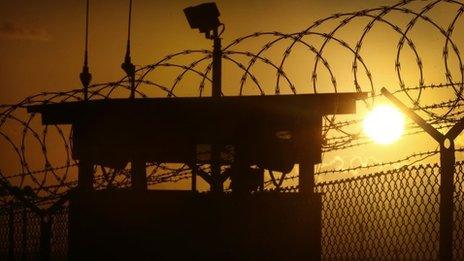Guantanamo Bay: Force feedings that test US secrecy
- Published
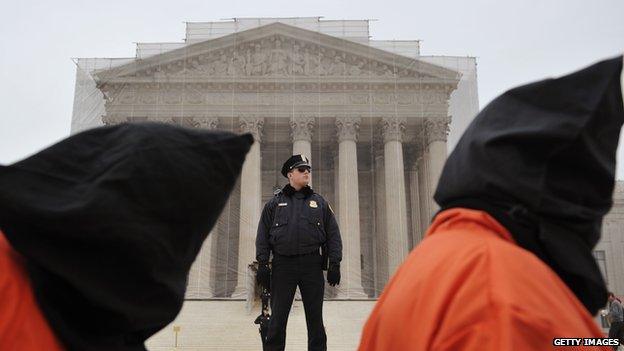
Protesters, shown here at the Supreme Court in 2013, have called for better treatment of detainees
For years judges have accepted the idea that accounts of detainees at the US prison at Guantanamo Bay, Cuba, should be kept secret. This week, one judge pushed back.
With oversized glasses and short, curly hair, US District Judge Gladys Kessler looks more like a school principal than a person who makes radical judgements about the government.
Sitting in a room decorated with thick, blue carpeting in a courthouse in Washington, she smiled. "It's always nice to see a full courtroom," she said.
A government lawyer began talking, the start of a hearing on the treatment of a Syrian, Abu Wa'el Dhiab, who is waging a hunger strike at Guantanamo.
Dhiab's request from the court is modest - not freedom, even from forced feedings, but a judicial order that changes how he's treated.
He wants, for example, to be force-fed only when he's on the verge of death. He also wants the guards to stop pulling him from his cell when he's taken to a place for the feedings.
His lawyers said he is "trussed up like an animal", with guards "straddling his back", and is placed in a "torture chair".
Then he's fed. He describes the way a "nurse just jammed a tube in my nose", causing "fire-like pain", according to his lawyers. Another time his nose bled.
A moment after the government lawyer started speaking, Judge Kessler interrupted. "I think there are a few additional chairs," she said, looking at someone in the doorway.
This was not something that the government lawyers wanted. They'd asked her to keep the doors closed.
They said videotapes of Dhiab, showing when he's pulled from his cell, are dangerous. If released to the public, the videotapes could "cause serious damage to national security", they said.
Judge Kessler scoffed. In her opinion, external she said their argument was "just plain implausible".
But she conceded a bit. She told the lawyers part of the hearing would take place in a private setting. Most of the hearing, though, would be held in an open courtroom.
In addition, she said, the videotapes should be edited to hide the faces of people who work at the prison - then released.
It's a dramatic change. Judges rarely give the military a hard time.
No-one doubts that photos and documents can be used as a recruiting tool for militant groups. Osama Bin Laden wrote in an al-Qaeda magazine, Inspire, about "the crimes at Abu Ghraib and Guantanamo", saying they "shook the conscience of humanity".
Government lawyers have used the same argument about protecting national security for many years. The CIA's effort to obtain information about al-Qaeda has been kept secret for that reason, for instance, as has the legal basis for the killing of a US citizen.
Critics say lawyers sometimes keep things hidden not to protect the US from attack but to shield officials from prosecution.
But things have changed. "We're a long way from that attack," said Wells Bennett, a Brookings Institution fellow who was attending the hearing, referring to 9/11 al-Qaeda attacks on the US.
"The judge was very, very sceptical about keeping stuff secret just because the government said it had to be," he said.
Other judges have also shown frustration. In August a federal district judge in New York City, Alvin Hellerstein, said the lawyers should explain more clearly why photos of detainees at the prison, Abu Ghraib, must remain secret.
Much about Guantanamo is already known. Those who have gone on hunger strikes have provided grisly accounts in the New York Times, external and in other publications.

Force feeding at Guantanamo
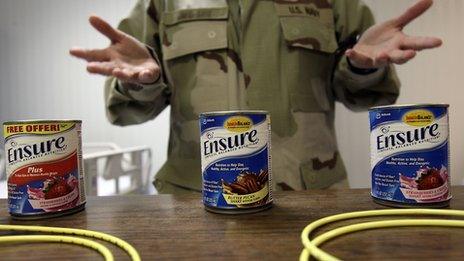
-Detainees can choose butter pecan, chocolate or vanilla
-Some take ibuprofen during the process
-Some sit in cushioned chairs while being fed
-Each session takes about 20 minutes
Source: AFP

But it's different to hear these stories in a courtroom, provided in testimony from physicians and in government documents.
"We're learning about the nuts and bolts about how people are force fed at Guantanamo," said Bennett. "What's really coming out of this hearing is how this business gets done."
In the courtroom journalists, campaigners (one woman smuggled in an orange T-shirt that said: "Close Guantanamo - stop torture") and others listened to stories about Dhiab.
He was accused of forging documents for al-Qaeda, according to military documents, external, and taken to Guantanamo in 2002. He was recommended for transfer out of the prison in 2009, but his home country is at war and US officials can't find a place to put him.
He has been on a hunger strike, on and off, for seven years. Yet his lawyer, Eric Lewis, said he's not trying to kill himself.
"You're in a 10ft-by-6ft rectangle for 12 years and every so often someone comes in and tells you you're going to be free," said Lewis. "But you're still in prison."
"It's a cry of humanity," said Lewis. "He feels he has no choice left but to make this protest."
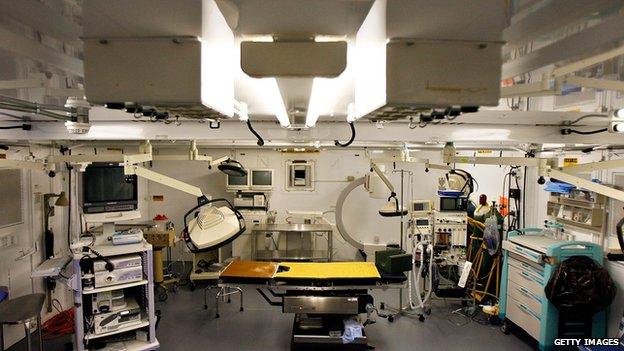
Some detainees are taken to a medical room at Guantanamo for the insertion of feeding tubes
He is a tall, 43-year-old man - 6ft 5in (1.95m) - and once worked in a restaurant. When he arrived at the prison, he weighed 179lb (81kg). He has dropped to 152lb.
Officials have put him on an intermittent schedule of forced feedings. They use a method known as "forced cell extraction" to transport him to the feedings, saying the method is necessary.
The lawyers showed a behavioural report on a screen, stating he had "threatened to jump off furniture and slam his head to kill himself". They say in other ways, too, he needs to be protected.
One of the government lawyers, Andrew Warden, said he is "about 40lb below his ideal body weight" and requires nutritional supplements.
US President Barack Obama said he supports the forced feedings. "I don't want these individuals to die," he said.
Warden said the feedings are done through a tube in a gentle manner. He held up a tube and said it was the kind used for babies. Another government lawyer said it "does not cause a great deal of pain".
He suffers from back trouble and prefers to leave the cell peacefully in a wheelchair. He did for a while. Then it was taken away. Several weeks ago he was given the wheelchair back.
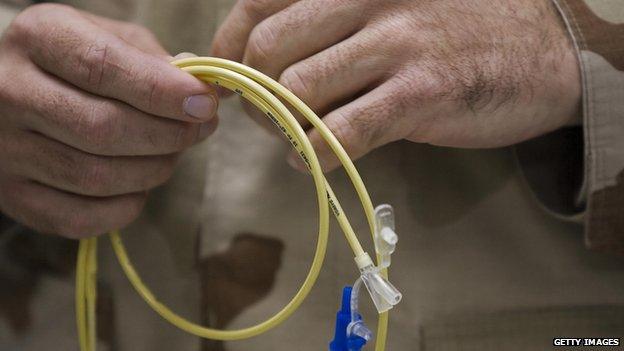
The government lawyers said the feeding tubes did not cause unnecessary pain for detainees
"It looks like medical care is being withheld as part of a disciplinary practice," said Dr Sondra Crosby, an internist who visited him at the prison. "It feels punitive on behalf of the medical staff."
"Doctors should be completely firewalled from disciplinary action," she said. "That distinction has been eroded."
Lawyers say they believe Judge Kessler will issue a ruling later this month. As she and others in the courtroom have demonstrated, the secrecy surrounding the treatment of detainees is lifting - but slowly.
In the final part of the hearing on Wednesday, the judge and lawyers watched the videotapes. The session was held behind closed doors.
Follow Tara McKelvey, external on Twitter.
- Published3 October 2014
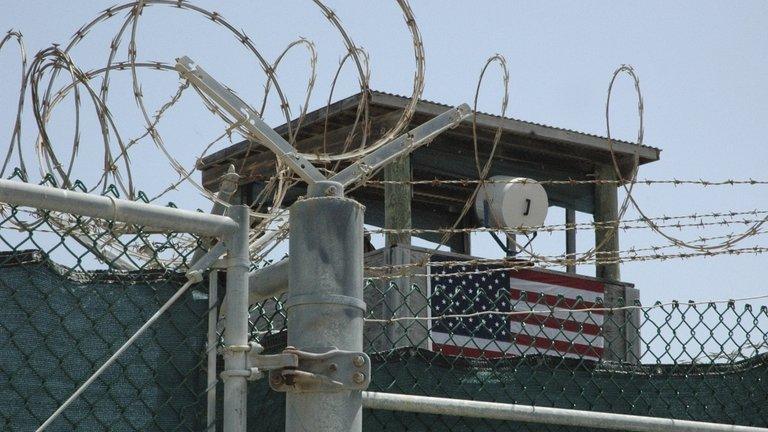
- Published23 May 2014
